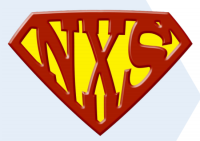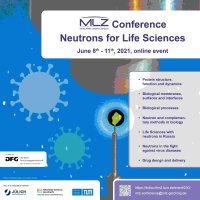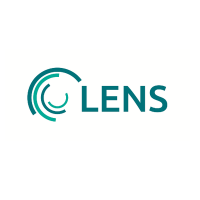Copyright 2012 neutronsources.org | All rights reserved. | Powered by FRM II | Imprint / Privacy Policy
Calendar of all events
JulyOnline event

The 13th international Polarized Neutrons for Condensed-Matter Investigations (PNCMI) Conference will be held online from July 27-30, 2021. The virtual PNCMI will feature 2 daily one-hour sessions from 9:00 am to 11:30 am US Eastern Time with a 30 minute break between sessions for 4 consecutive days and include both invited and poster presentations.
NIST: National Institute of Standards and Technology
Virtual

The main purpose of the National School on Neutron and X-ray Scattering is to educate graduate students in the use of major neutron and x-ray facilities. Lectures, presented by researchers from academia, industry, and national laboratories, include basic tutorials on the principles of scattering theory and the characteristics of the sources, as well as seminars on the application of scattering methods to a variety of scientific subjects. Students will conduct short remote experiments at Argonne’s Advanced Photon Source and at Oak Ridge National Laboratory’s Spallation Neutron Source and High Flux Isotope Reactor, which provides hands-on experience using neutron and synchrotron sources.
Oak Ridge National Laboratory
Buenos Aires, Argentina
The ICNS 2021 will be the largest international platform for sharing and exchanging the latest exciting advances in neutron scattering science, including a broad range of topics:
Soft Matter
Biology and Biological Interfaces
Condensed Matter Physics
Magnetism and Thin Films
Solid State Chemistry
Life Sciences
Energy and Engineering Materials
Functional Materials
Industrial Applications
Cultural Heritage and Archaeometry
Neutron Physics
Neutron Sources and Facilities
Asociación de Técnicas Neutrónicas de Argentina (ATENA) / Argentine Neutron Techniques Association
Virtual
This is a Zoom-based training course on data analysis software for time-of-flight neutron spectroscopy. It focuses mainly on the Horace and SpinW software packages, but also includes courses on the Euphonic program, and the MSlice and crystal fields modules in Mantid. The course will comprise of 2h lessons each morning and a self-directed worksheet in the afternoon with teachers available for help. Each day will focus on a different program or different aspects of a program and you need not attend all days.
ISIS Neutron and Muon Facility
Virtual
This online course is designed for graduate students, post-doctoral researchers and faculty with knowledge of structure and function of biological macromolecules but with limited to no experience with neutron sciences. The course will cover the basics of deuterium labeling, small angle neutron scattering, neutron reflectometry, neutron spectroscopy, neutron imaging and neutron crystallography. Lectures will cover basic concepts, sample preparation, instrumentation and applications. Data collection and processing will be discussed in tutorials.
Oak Ridge National Laboratory
Online event

The MLZ Conference Neutrons for Life Sciences is approaching rapidly and we are happy to provide you with the latest information:
The virtual conference will start on Tuesday, 8 June at 10:15 AM, and will close on Friday, 11 June around noon.
For more detailed information on the timetable, please visit https://indico.frm2.tum.de/event/230/timetable/#20210608.
If you have not registered yet, you might do so here: https://indico.frm2.tum.de/event/230/registrations/126/
We warmly welcome participation and contributions from the Life Sciences community independently of their specific discipline, regardless whether they have used neutron scattering techniques or not.
MLZ
Hybrid - Evangelische Akademie Tutzing, Germany
This WE-Heraeus-Seminar focuses on the technique of magnetic small angle neutron scattering, which is one of the most important methods for magnetic microstructure determination in condensed-matter physics and materials science. Magnetic SANS provides access to bulk properties and yields, quite uniquely, information on the mesoscopic length scale (roughly 1-1000 nm). This is an important size regime where many macroscopic materials properties are realized.
Application deadline: 28 March 2021
Wilhelm und Else Heraeus-Stiftung
San Sebastian, Spain
QUENS 2021
Following the spirit of QENS Conferences since 1992, the main purpose of QENS 2021 is to cover the broad spectrum of scientific activities related with the investigation of material dynamics using quasi-elastic neutron scattering techniques (accessing both, frequency and time domains). QENS 2021 will offer a platform for discussion and exchange of scientific ideas among the experts in this field, and a general overview to newcomers about the capabilities of QENS in exploring atomic and molecular motions and relaxation processes of novel materials. As a novelty, this QENS Edition will explore and exploit the potential synergies between different methods (including experimental techniques and simulations, but always with QENS in the spotlight), in order to face diverse scientific challenges emerging in different research fields.
The following scientific topics will be covered:
- Dynamics of liquids in different environments and under confinement
- Dynamics of polymers in bulk, blends, gels, membranes, films, composites etc. at different length scales
- Function/dynamics relation in biological and bio-related systems
- Role of dynamics in systems of medical relevance
- Transport mechanisms in energy-related materials
- Dynamical processes in soft matter, including liquid crystals, self-assembled materials, colloids, etc.
- Dynamics of novel materials for industrial applications
- Relaxation phenomena involved in the glass transition
- Lattice dynamics and Spin dynamics of magnetic systems
- Complementarity with the following methods will be explored:
Experimental techniques:
- Spectroscopic and relaxation techniques like e. g., dielectric spectroscopy, NMR, rheology, calorimetry, etc
- Other scattering techniques providing dynamic and/or complementary structural information, like e. g., dynamic light scattering, Brillouin scattering, X-ray photon correlation spectroscopy, diffraction, small angle scattering…
Simulations and Theory:
- Molecular Dynamics Simulations, including fully atomistic and coarse-grained models
- Monte-Carlo simulations
- DFT, Analytical methods, …
WINS 2021
WINS2020 --the 9th Workshop on Inelastic Neutron Spectrometers– will cover innovative aspects of neutron instrument design. Progresses on new spectrometer projects will be presented. As in previous editions, the theme of “New idea, New concept, New design, New instrumentation for New sciences” will be followed. New developments in the application of polarization analysis, magnetic field, pressure, or improvements in sample environments for soft matter systems will be covered. Software for data acquisition, analysis and instrument simulation will be also part of the program. In analogy with the spirit of QENS 2021, the synergy with complementary methods –in this case mainly with advanced simulations and extensive Monte Carlo simulations—will be emphasized.
The workshop will consider:
- New ideas, new concepts and new designs for neutron spectrometers
- Novel devices, detectors and sample environments: polarization, magnetic field, pressure, soft matter environments
- Software for data acquisition and analysis
- Complementary computer methods for instrument simulation
Virtual

Many debilitating neurodegenerative diseases such as Alzherimers/Parkinsons and Huntington’s are linked to protein misfolding and aggregation into amyloid fibrils and plaques in the brain. This webinar focuses on how neutron scattering techniques can elucidate the structures and steps involved in the aggregation mechanisms to provide crucial information to understand and combat these diseases and to develop better medications.
11:00 CET - Emma Sparr (Lund University): Co-assembly of lipids and the amyloid protein alpha-synuclein
11:30 CET - Pau Bernadó (CBS/CNRS Montpellier): Structural Bases of Huntington’s Disease Pathological Threshold. An Integrative Structural Biology Approach.
12:00 - 12.30 CET - Discussion
Chair: Anne Martel (ILL)
Join via Zoom: https://ill.zoom.us/j/99877481390
LENS Initiative
Forschungszentrum Juelich, Germany
Imagine what we would know - or better: would not know - about the structure and dynamics of microscopic systems if scientists such as Albert Einstein (Nobel Prize 1921), Niels Bohr (Nobel Prize 1922), Werner Heisenberg (Nobel Prize 1932), Erwin Schrödinger, Paul Dirac (Nobel Prize 1933) and many others would not have imagined and formalised quantum mechanics. This theory provided the understanding of fundamental aspects of the interaction between matter and radiation to the level needed to make atoms work for us in new and most remarkable ways. It heralded the first quantum revolution which began with the discovery of the transistor (Nobel Prize 1956 to William Shockley, John Bardeen and Walter Brattain) and the laser (Nobel Prize 1964 to Charles Townes, Nicolay Basov and Aleksandr Prokhorov). Many of the amenities we have become accustomed to (for example, computers, smartphones, GPS, solid-state light) are based on these technologies.
Today, our ability to use previously untapped quantum effects in customised systems and materials is paving the way for a second revolution. With quantum theory now fully established, we are required to look at the world in a fundamentally new way: objects can be in different states at the same time (superposition) and can be deeply connected without any direct physical interaction (entanglement). There are many transformative applications, varying from products with a relatively short time to market through to revolutionary new technologies that may require more than a decade of research and development. Quantum computers are expected to be able to solve in a few days, problems that are unsolvable by the supercomputers of today and tomorrow. This, in turn, will seed breakthroughs in the design of chemical processes, new materials, such as higher temperature superconductors, and new paradigms in machine learning and artificial intelligence.
Based on quantum coherence, data can be protected in a completely secure way that makes eavesdropping impossible. Given the explosive growth of cybercrime and espionage, this is a highly strategic capability. Quantum technologies will also give rise to simulation techniques well beyond current capabilities for material and chemical synthesis, and to clocks and sensors with unprecedented sensitivity and accuracy, with potential impact for navigation, the synchronisation of future smart networks and medical diagnostics.
FZ Juelich
Dear colleagues,
The Fourth International Workshop on Searches for a Neutron Electric
Dipole Moment will take place at the École de Physique des Houches, in
France, from February 14-19, 2021. Please find further details below,
and an updated poster attached.
Pre-registration is now open :
https://lpsc-indico.in2p3.fr/event/2584/registrations/96/
Complications arising from COVID-19 have reduced the on-site capacity at
Les Houches to 39 participants. We hope to accommodate a maximum of
participants on-site, but in recognition of practical uncertainties the
workshop will also fully support remote participation. The schedule of
presentations will also be shifted to afternoon/evening local time, to
facilitate remote particpation from North America.
November 30th is the deadline for abstract submission and
pre-registration. The conference fee (payable until the end of January)
is 480 euros per on-site participant, covering room and board at the
École de Physique des Houches. Transport to Les Houches from Grenoble
can be arranged for on-site attendees; alternatively the school can be
accessed by commercial shuttles from Geneva airport. Support for
students is available, at the level of a 50% discount: to apply, please
contact the organizers with a letter of support from your advisor.
Remote participants must also pre-register, but no fee is required.
Final decisions between in-person or remote participation must be made
by the payment deadline, i.e. before the end of January.
We wish you all a productive and healthy fall, and we hope to see many
of you in Les Houches in February!
Sincerely,
The workshop organizers:
Skyler Degenkolb, Guillaume Pignol, and Stéphanie Roccia
The international advisory committee:
Brad Filippone, Thomas Lefort, Chen-Yu Liu, and Rüdiger Picker
École de Physique des Houches
The 26th "CHRNS Summer School on Methods and Applications of Small Angle Neutron Scattering and Neutron Reflectivity” originally planned for June 1-5, 2020 at the NIST Center for Neutron Research (NCNR), will now be held virtually, on Mondays Wednesdays and Fridays, February 3 -12, 17, and 19, 2021.
If you have already applied for the summer school your application is still valid, and you will be contacted with an option to confirm, or to withdraw your application if you no longer want to be considered.
New applications are being accepted Early application is advised since attendance is strictly limited and typically we receive more applications than the maximum number of participants. Deadline: November 16, 2020.
For further information about the school go to:
https://www.nist.gov/ncnr/chrns/education-and-outreach/chrns-summer-school-neutron-scattering
This school provides participants the opportunity to learn about small angle neutron scattering (SANS), and neutron reflectometry (NR) from scientists at the NIST Center for Neutron Research (NCNR). These powerful experimental techniques are used by researchers in a variety of scientific disciplines to probe the microstructure of materials at length scales ranging from 1nm to 20 microns.
This school emphasizes hands-on practical training on data reduction and analysis for the instruments mentioned above as well as a thorough theoretical overview of these measurement techniques. Applications of these techniques will be illustrated by specific examples drawn from recent cutting-edge research on polymer science, magnetic materials, complex fluids, biology/biophysics, microporous media, and more. The course will enable attendees to assess the applicability of the techniques to their own research and will provide the technical information needed to prepare effective beam time proposals. The school is sponsored by the Center for High Resolution Neutron Scattering (CHRNS), jointly funded by the National Science Foundation and NIST. Attendance will be limited to 36 participants, and only applicants from North American institutions will be accepted.
For further information, and/or to apply, please go to: https://www.nist.gov/ncnr/chrns/education-and-outreach/chrns-summer-school-neutron-scattering
Joe Dura and Jose Rodriguez-Rivera
National Institute of Standards and Technology
Center for Neutron Research
NIST
Joe Dura and Jose Rodriguez-Rivera
Dear colleagues,
We are organizing a Muon 2-day Workshop in February 1-2, 2021. The workshop will be virtual given the ongoing COVID-19 pandemic that makes it impossible for us to meet in person. The Virtual Muon Workshop will give us an opportunity to listen to muon experts and discuss the possibility for constructing a future Muon facility in the United States at Oak Ridge National Laboratory. Your input on the scientific needs and design specifications will be most valuable. We hope you will join us in February!
Monday 1st February 08:00 – 14:30 - Eastern US time
Tuesday 2nd February 08:00 – 14:45 - Eastern US time
Registration will open on December 1, 2020. To register please visit the workshop website https://www.mrs.org/muon-2021. REGISTRATION IS FREE but we will need a count of the people participating. So please register.
Zoom details for the talks and breakout sessions will be provided as the meeting date approaches.
If you have any questions, please contact us. If interested in giving a short talk, we can arrange it during the breakout sessions.
We look forward to your participation and to a productive workshop.
Best wishes,
Despina Louca - University of Virginia
Greg MacDougall - University of Illinois at Urbana-Champaign
Travis Williams - Oak Ridge National Laboratory
Dear Colleague,
We hope that you are doing well!
We are pleased to announce a satellite workshop to the ESS-ILL User Meeting, focused on:
Atomic-scale simulations in neutron scattering
The workshop will be held virtually via Zoom on January 20th and 21st 2021,
between 13:00 and 18:00 (Central European Time) and is aimed to show recent
advances and applications of computer simulations in combination with neutron
scattering experiments.
The list of confirmed speakers can be consulted in the workshop page (see below),
but additional contributions (with special consideration for young scientists)
will be considered and selected among the abstracts received before December 15th.
You can register freely until the day before the event at this address:
https://indico.esss.lu.se/event/2411
Sincerely yours,
Danielle Adonis
Thomas Holm Rod
Miguel A. Gonzalez
If you do not wish to receive this type of email from the ILL in the future:
1) if you are a member of the Visitors Club please login to the Visitors Club (http://club.ill.fr/cv/) and untick the box for the subscription to our mailing list in your personal data page;
2) if you are not a member of the Visitors Club please click here:
http://www.ill.eu/quick-links/publications/guide-to-ill-mailing-lists/
ESS-ILL
If you would like to add your event to this calendar please contact us at info@neutronsources.org. To be informed of neutron-related activities and developments please subscribe to the neutron sources mailing list.